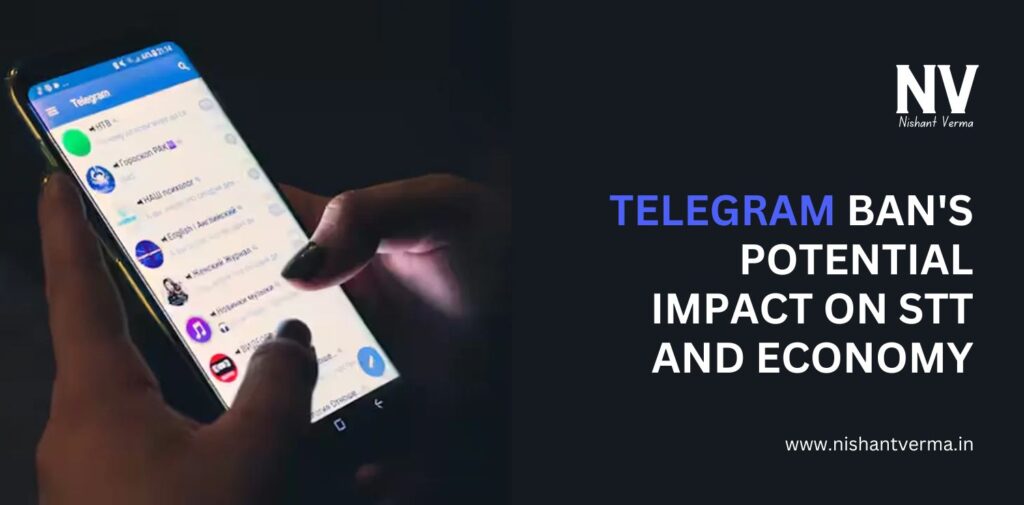The potential ban on Telegram in India has generated a buzz across various sectors, not just among regular users but also within financial circles, particularly concerning its impact on the Security Transaction Tax (STT) collection. This connection may seem obscure at first, but it underscores how digital platforms like Telegram indirectly influence multiple facets of the economy, including tax revenue.
Telegram’s Widespread Usage and Legal Scrutiny
Telegram has grown immensely popular in India, with millions of users relying on it for everything from casual communication to more controversial uses like sharing pirated content or accessing exam-related information. However, this popularity has also brought the app under legal scrutiny. Recent developments include the arrest of Telegram’s CEO in France, which has prompted Indian authorities to reassess the app’s operations within the country, potentially leading to ban.

The app’s association with illegal activities like copyright infringement, drug trafficking, and other forms of organized crime has led to increased pressure on the Indian government to act. Telegram’s refusal to disclose user data, citing its privacy policies, has further complicated matters, especially in cases involving intellectual property violations and exam-related controversies.
The Impact on Security Transaction Tax (STT) Collection
The connection between a potential Telegram ban and STT collection may not be immediately obvious, but it’s crucial to understand how Telegram is used by various market participants. Telegram hosts numerous groups where users share trading tips, stock market analysis, and other financial insights, often bypassing traditional and regulated financial advice channels. These groups have become significant influencers in the trading activities of both amateur and seasoned investors.

If Telegram were banned, many of these trading groups would be disrupted, potentially leading to a decline in trading volumes, especially among retail investors who rely on such platforms for their trading strategies. A reduction in trading volumes would directly impact the STT collected by the government. STT is a tax levied on every transaction made on the Indian stock exchanges, and a decrease in trading activity would lead to a proportionate decrease in this tax revenue.
Why Would a Ban Lead to Such a Significant Impact?
Several factors make Telegram a critical tool for traders in India:
Accessibility: Telegram allows users to join groups and channels that provide real-time trading information, making it accessible to a wide audience, including those in remote areas where traditional financial services might be limited.
Anonymity: The app’s privacy features attract users who prefer to trade based on information shared anonymously. This includes tips from insiders or market manipulators, who would otherwise be deterred by more regulated platforms.

Community Engagement: Telegram fosters communities where traders can discuss strategies and market movements, contributing to higher participation in the stock market. This collective engagement can drive trading volumes, which in turn boosts STT collection.
Alternative Information Sources: With a ban on Telegram, traders may lose access to non-mainstream market insights that drive their trading decisions. This could result in a more cautious trading environment, further reducing volumes and STT revenues.
Broader Economic and Social Implications
Beyond the direct impact on STT, the ban could have broader economic and social repercussions. For instance, students and exam aspirants, who use Telegram to access study materials and past papers, may face challenges. This could lead to a significant outcry, given the app’s role in providing free educational content, albeit sometimes illegally shared.

Moreover, Telegram has become a hub for sharing pirated OTT content, which indirectly affects the entertainment industry by reducing legitimate subscription revenues. A ban might push users to seek alternative, potentially less secure platforms, complicating the fight against piracy
Government’s Balancing Act
For the Indian government, deciding on a potential ban involves balancing the need to curb illegal activities and protect intellectual property rights against the broader economic impacts. Banning Telegram could be seen as a strong move to enforce legal norms, but it also risks alienating a significant portion of the population who use the app for legitimate purposes.
Furthermore, the financial implications of reduced STT collection could lead to lower government revenues, impacting public spending. This presents a dilemma where the government must weigh the benefits of curbing illegal activities against the economic costs of disrupting a popular platform like Telegram.
Conclusion
The possible ban on Telegram in India illustrates the complex interplay between digital platforms, economic activities, and legal regulations. While the ban could address significant legal and ethical issues, it also risks disrupting financial markets and reducing government revenue through decreased STT collection. As the government continues to evaluate its options, it must consider these multifaceted impacts to arrive at a decision that balances enforcement with economic stability.




